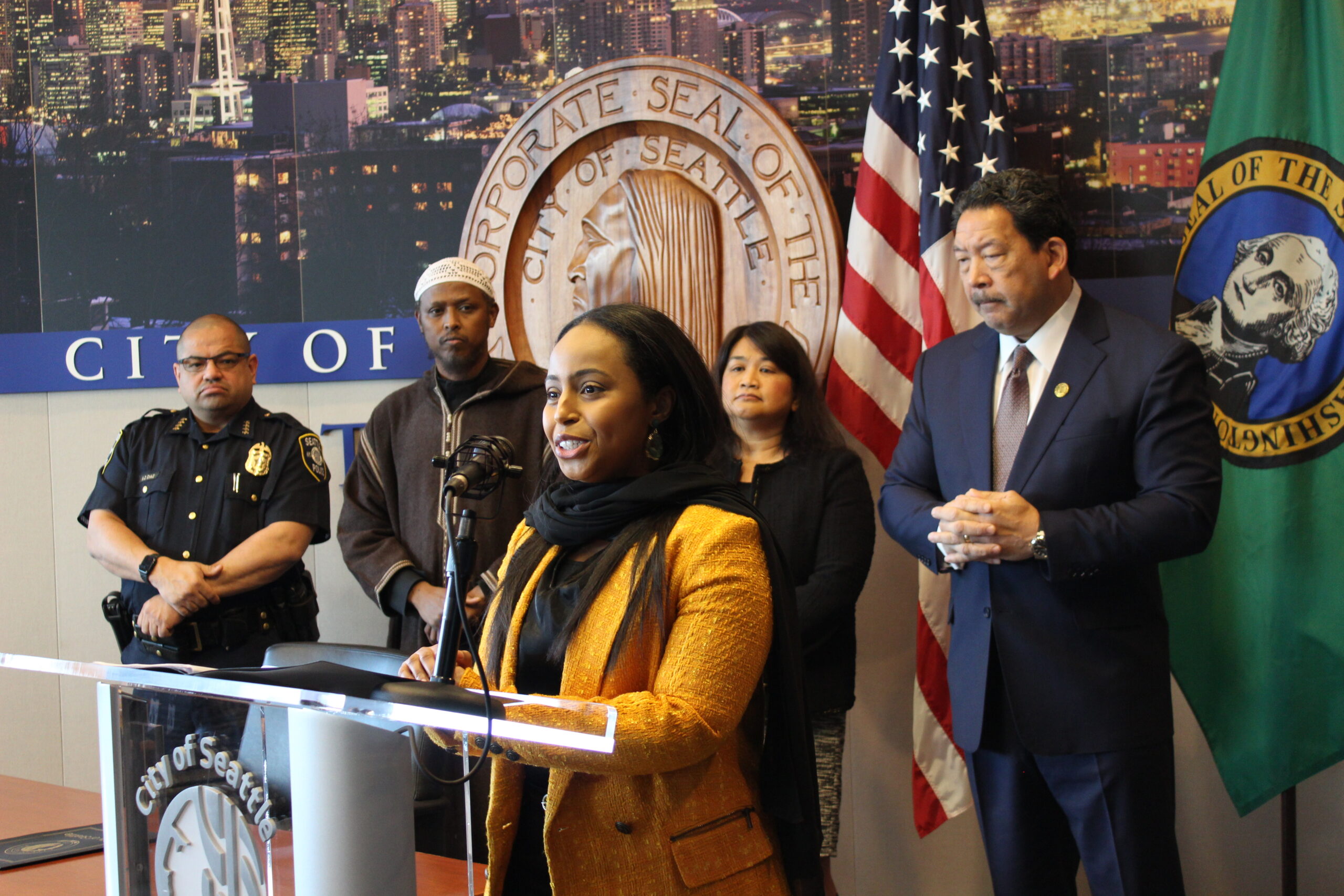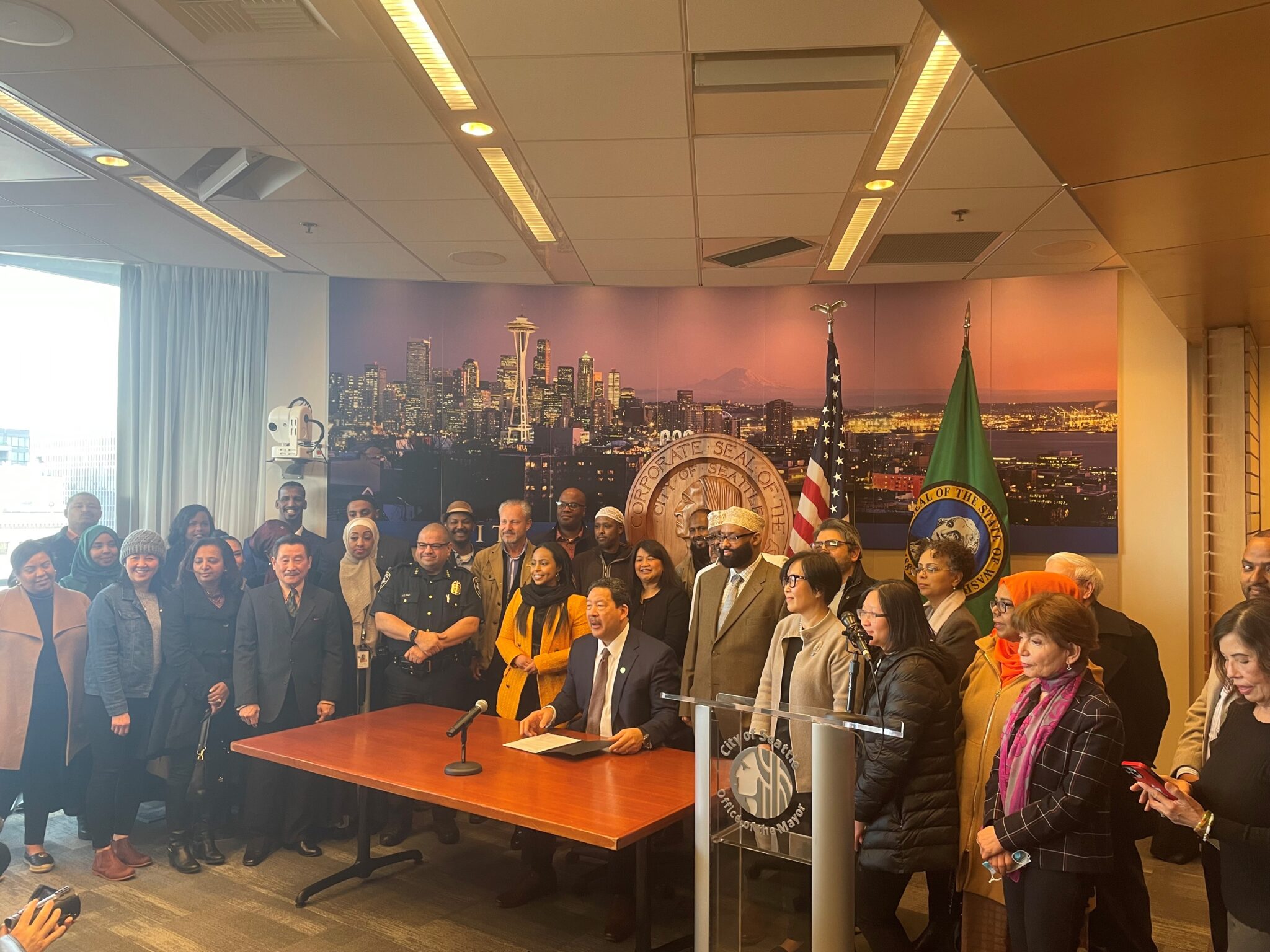
The application period for this program ended 3/9/2023.
Funding announcements will be made on Monday, April 10.

About the Immigrant Safety & Access Network (ISAN)
Anticipated Funding and Contracts
Answers to Submitted Questions/Frequently Asked Questions (FAQ)
ISAN RFP Online Information Session
Applications due on Thursday, March 9, 2023, at 5:00 PM
The City of Seattle Office of Immigrant and Refugee Affairs (OIRA) in partnership with the King County Office of Equity, Racial and Social Justice (OERSJ) is pleased to solicit applications for the 2023 Immigrant Safety & Access Network (ISAN). This program will award approximately $200,000 in contract awards throughout Seattle and King County.
About the Immigrant Safety & Access Network (ISAN)
ISAN builds upon OIRA’s Immigrant Family Institute (IFI), which ran from 2018 to 2020. In keeping with the intent of the legislation that established IFI and reflecting updated needs reported by immigrant and refugee community members, the City of Seattle is partnering with King County to establish a network of community-based supports for immigrant and refugee families.
ISAN’s overarching goals are:
- Improve outcomes for youth and young adults from immigrant and refugee communities and their families who experience harm from violence and involvement in criminal legal systems.
- Build upon existing community initiatives that are not sufficiently funded.
- Decrease identity-based disproportional harm and outcome disparities.
Anticipated Funding and Contracts
- Approximately $200,000 will be awarded to non-profit organizations.
- Awards will be for up to $58,000.
- Award contracts will be for 12 months, starting on May 1, 2023 and ending on April 30, 2024.
Program Goals
- Improve outcomes for youth and young adults from immigrant and refugee communities and their families who experience harm from violence and involvement in criminal legal systems.
- Build upon existing community initiatives that are not sufficiently funded.
- Decrease identity-based disproportional harm and outcome disparities.
Eligible Applicants
Community-based 501(c)3 organizations or community-based organizations under fiscal sponsorship by a 501(c)3 entity are eligible to apply for ISAN funding. Services must be delivered within the city of Seattle and/or King County, even if the applying organization is located outside of the service area.
Eligible applicants must comply with applicable federal, state, and local nondiscrimination laws and standards, including having non-discrimination hiring practices in place. Further, the applicant shall not:
- Require payment from participants for services provided.
- Require eligible participants to participate in a religious service or activity as a condition of receiving services.
- Contract with or make referrals to for-profit entities.
Application Materials (3 Documents)
- RFP (Request For Proposals) Guidelines
- Application Cover Sheet and Narrative Questions
- Budget Workbook
The RFP Guidelines provide detailed information about the program and requirements for the ISAN program.
The Application Cover Sheet and Narrative Questions include all the information required form each applicant and instructions for providing responses.
The Budget Workbook includes instructions, including a list of allowable expenses, and budget narrative questions. Please complete the second and third spreadsheets of the workbook.
Submission Instructions
Please submit one (1) copy of the application that includes: Application Cover Sheet, Narrative Questions, Budget Workbook, and supplemental materials (if applicable).
Completed applications should be sent to OIRARFP@seattle.gov by 5:00 PM Pacific Standard Time on Thursday, March 9, 2023, to be considered received by the deadline.
Please note the following when preparing to submit a proposal:
- Facsimile copies or hard copies of proposals will NOT be accepted.
- Proposals that do not arrive at the specified email address by the submission deadline will not be accepted.
- Proposals that do not follow the specified format and/or meet the submission requirements will not be reviewed.
- All electronic copies of application narrative and budget worksheet must be in PDF or other non-editable format.
Interpretation and translation requests related to the RFP process can also be directed to:
OIRARFP@seattle.gov
(206) 561-7114
Answers to Submitted Questions/Frequently Asked Questions (FAQ)
1. When is the application due?
Completed applications should be sent to OIRARFP@seattle.gov by 5:00 PM Pacific Standard Time on Thursday, March 9, 2023, to be considered received by the deadline.
2. Can this funding serve people who live outside of Seattle City limits?
Yes. ISAN funding can be used for service provision to residents of King County, including but not limited to the city of Seattle.
3. Can ISAN funding be used to build on existing victim support services that reimburse small business owners for property damage?
No. Direct assistance for project participants, and their families, who are victims of crime, must be in in accordance with Washington State’s Department of Labor & Industries Crime Victim Benefits, which does not include property crime.
4. If my organization already contracts with professional interpreters and translators, must my project comply with the ISAN requirements to use the City’s centralized language access services?
Applicants that have existing professional interpretation and translation support that they can leverage to the benefit of the proposed ISAN project should explain these partnerships in their application narrative. The Office of Immigrant and Refugee Affairs (OIRA) will work with funded applicants on a case-by-case basis to ensure that any existing interpretation and translation services will meet ISAN standards.
5. Who is eligible to receive services funded by ISAN?
ISAN’s primary population focus is youth and young adults from immigrant and refugee backgrounds, defined as:
- Children aged 12 to 17 years (youth)
- Adults aged 18 to 24 years (young adults)
- Those born outside the United States
- Those born within the United States to at least one foreign-born parent.
However, we understand that when violence occurs for young people there is a ripple effect to the families involved. Therefore, impacted family members of young people served by ISAN-funded services may also receive relevant services. Family members are defined as:
- Siblings
- Parents
- Legal guardians
- Caregivers
- Spouses or domestic partners
- Other family members who are part of a multi-generational household where the young person resides.
6. Can ISAN funding be used to pay for legal services, including direct legal representation of minors?
Yes. However, eligible legal services must be provided by community-based 501(c)3 organizations or community-based organizations under fiscal sponsorship by a 501(c)3 entity. For profit or private attorney fees are not an eligible ISAN expense.
7. Can ISAN funding be used to pay for court or other administrative fees related to criminal legal proceedings (e.g. processing or filing fees related to expunging a criminal record)?
Yes. However, if this is the primary function of the proposed project, the application narrative should describe in detail how it aligns with ISAN’s overarching goals:
- Serve youth and young adults from immigrant and refugee communities and their families who experience harm from violence and involvement in criminal legal systems.
- Build upon existing community initiatives that are not sufficiently funded.
- Decrease identity-based disproportional harm and outcome disparities.
8. Can ISAN funding be used to pay for mental health services?
Yes. However, eligible mental health services must be provided by community-based 501(c)3 organizations or community-based organizations under fiscal sponsorship by a 501(c)3 entity.
9. Should applicants submit letters of support from community partners?
Yes, if they help demonstrate existing partnerships and/or buy-in from potential partners for the project. Letters of support are entirely optional. Please limit letters of support to a maximum of three, one-page letters.
10. Can ISAN funds be used to provide services to victims of crimes that happened before the contract period?
Yes. The crime or violent event that ISAN-funded services respond to may have happened before the contract period starts. However, ISAN funding cannot be used to retroactively pay for services that were delivered prior to the contract period.
11. Can ISAN funding be used for relocation expenses related to domestic violence?
Yes. Competitive applications will not be duplicative of existing domestic violence programming and will instead be positioned to help young immigrants, refugees, and their families navigate and access those services.
An Additional Note About ISAN’s Goals
ISAN is a pilot project. Competitive applications will help demonstrate and help quantify the impact of increasing:
- Availability of information, including through improved translation and interpretation support.
- Access to existing government programs, such as victim support services.
- Support for young immigrants, refugees, and their families who experience harm from violence to navigate resources.
ISAN RFP Information Session Video Recording
Due to technical difficulties with an earlier online information session, we recorded a second information session that took place Friday, February 24, 2023. Stakeholders asked questions about the RFP process and about the new ISAN program. We have made the session available here if you were not able to attend and might have similar questions. If you still have questions about applying for the ISAN program, you can email them to: OIRARFP@seattle.gov.


